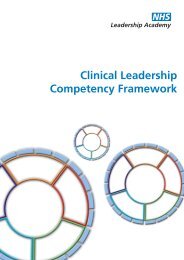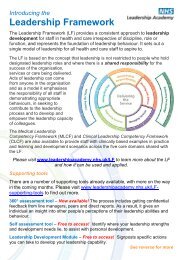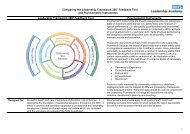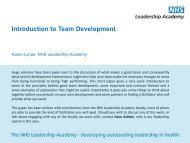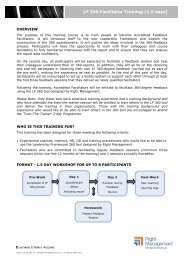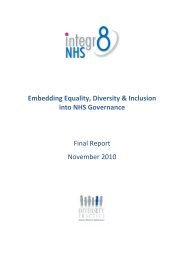Healthy NHS Board: a review of - NHS Leadership Academy
Healthy NHS Board: a review of - NHS Leadership Academy
Healthy NHS Board: a review of - NHS Leadership Academy
You also want an ePaper? Increase the reach of your titles
YUMPU automatically turns print PDFs into web optimized ePapers that Google loves.
Innovation<br />
Recent guidance describes innovation as ‘sensible<br />
risk taking’ (Committee on Standards in Public Life,<br />
2013). The English <strong>NHS</strong> constitution features several<br />
commitments to innovation, for example in support<br />
<strong>of</strong> improving standards <strong>of</strong> healthcare and improving<br />
people’s lives (Department <strong>of</strong> Health, 2013b,<br />
Department <strong>of</strong> Health, 2013a). Research suggests that<br />
innovation should be purposeful and not ‘innovation for<br />
its own sake’ (Alimo-Metcalfe, 2012).<br />
Heavy monitoring <strong>of</strong> an organisation may limit<br />
innovation (Chambers et al., 2013) and boards should<br />
ensure they balance risk aversion and innovation<br />
(Welbourn et al., 2012). Risk aversion may be driven<br />
by external factors, such as the media (Committee on<br />
Standards in Public Life, 2013).<br />
High levels <strong>of</strong> engagement are associated with high<br />
levels <strong>of</strong> innovation (Welbourn et al., 2012). Engaging<br />
board leadership may support innovation through<br />
activities such as ‘marketplace’ and ‘dragon’s den’ style<br />
events are recommended as useful stimuli (Alimo-<br />
Metcalfe, 2012).<br />
Recent healthcare research (Jacobs et al., 2012) and a<br />
<strong>review</strong> <strong>of</strong> non-healthcare literature (Büschgens et al.,<br />
2013) using the Competing Values Framework confirm<br />
previous research suggesting that organisational culture<br />
influences innovation. The <strong>review</strong> concludes that a<br />
flexible, externally oriented culture is most likely to be<br />
associated with innovation, but a corollary <strong>of</strong> this is a<br />
potentially unattractive loss <strong>of</strong> stability (Büschgens et al.,<br />
2013).<br />
www.leadershipacademy.nhs.uk 21



